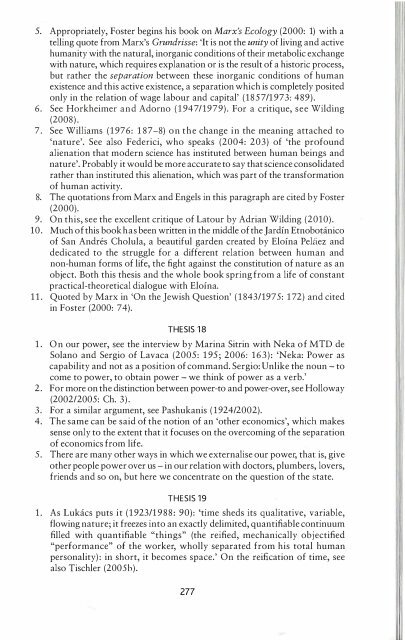CRACK CAPITALISM
Holloway - Crack Capitalism
Holloway - Crack Capitalism
- No tags were found...
Create successful ePaper yourself
Turn your PDF publications into a flip-book with our unique Google optimized e-Paper software.
5. Appropriately, Foster begins his book on Marx's Ecology (2000: 1) with a<br />
telling quote from Marx's Grundrisse: 'It is not the unity of living and active<br />
humanity with the natural, inorganic conditions of their metabolic exchange<br />
with nature, which requires explanation or is the result of a historic process,<br />
but rather the separation between these inorganic conditions of human<br />
existence and this active existence, a separation which is completely posited<br />
only in the relation of wage labour and capital' (1857/1 973: 489).<br />
6. See Horkheimer and Adorno (1947/1979). For a critique, see Wilding<br />
(2008).<br />
7. See Williams (1976: 187-8) on the change in the meaning attached to<br />
'nature'. See also Federici, who speaks (2004: 203) of 'the profound<br />
alienation that modern science has instituted between human beings and<br />
nature'. Probably it would be more accurate to say that science consolidated<br />
rather than instituted this alienation, which was part of the transformation<br />
of human activity.<br />
8. The quotations from Marx and Engels in this paragraph are cited by Foster<br />
(2000).<br />
9. On this, see the excellent critique of Latour by Adrian Wilding (2010).<br />
10. Much of this book has been written in the middle of the Jardin Etnobotanico<br />
of San Andres Cholula, a beautiful garden created by Eloina Peliiez and<br />
dedicated to the struggle for a different relation between human and<br />
non-human forms of life, the fight against the constitution of nature as an<br />
object. Both this thesis and the whole book spring from a life of constant<br />
practical-theoretical dialogue with Eloina.<br />
11. Quoted by Marx in 'On the Jewish Question' (1843/1975: 172) and cited<br />
in Foster (2000: 74).<br />
THESIS 18<br />
1. On our power, see the interview by Marina Sitrin with Neka of MTD de<br />
Solano and Sergio of Lavaca (2005: 195; 2006: 163): 'Neka: Power as<br />
capability and not as a position of command. Sergio: Unlike the noun - to<br />
come to power, to obtain power - we think of power as a verb.'<br />
2. For more on the distinction between power-to and power-over, see Holloway<br />
(2002/2005: Ch. 3).<br />
3. For a similar argument, see Pashukanis (1924/2002).<br />
4. The same can be said of the notion of an 'other economics', which makes<br />
sense only to the extent that it focuses on the overcoming of the separation<br />
of economics from life.<br />
5. There are many other ways in which we externalise our power, that is, give<br />
other people power over us - in our relation with doctors, plumbers, lovers,<br />
friends and so on, but here we concentrate on the question of the state.<br />
THESIS 19<br />
1. As Lukacs puts it (1923/1988: 90): 'time sheds its qualitative, variable,<br />
flowing nature; it freezes into an exactly delimited, quantifiable continuum<br />
filled with quantifiable "things" (the reified, mechanically objectified<br />
"performance" of the worker, wholly separated from his total human<br />
personality): in short, it becomes space.' On the reification of time, see<br />
also Tischler (2005b).<br />
277


